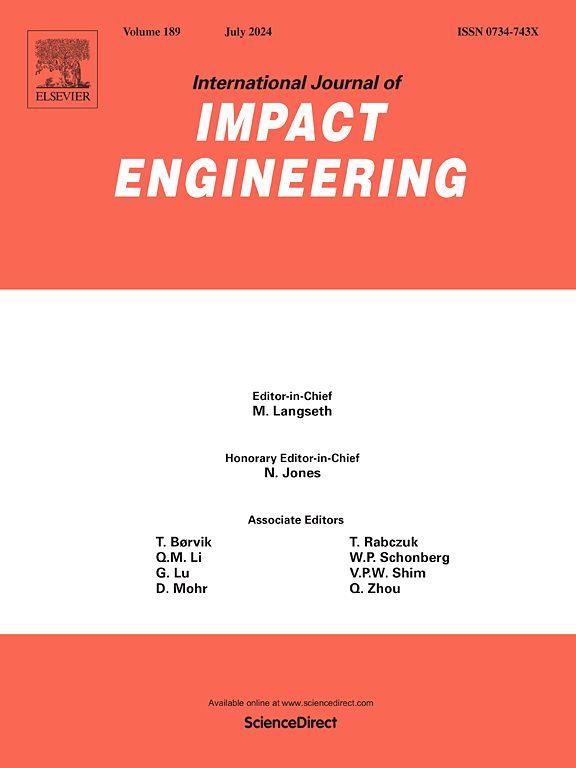Effects of shear thickening fluid filling in additively manufactured sandwich panels during intermediate and high strain rate penetration
IF 5.1
2区 工程技术
Q1 ENGINEERING, MECHANICAL
International Journal of Impact Engineering
Pub Date : 2025-06-19
DOI:10.1016/j.ijimpeng.2025.105430
引用次数: 0
Abstract
Along with metal foams and lattices based on various unit-cell architectures, sandwich panels have become a prospective solution to problems involving deformation energy mitigation. The combination of a face sheet and a porous core in the sandwich panel exhibits synergistic effects in its effective properties, which has attracted attention in the field of dynamic impact and blast perforation. Further advances can be inspired by the performance of interpenetrating phase composites (IPPCs). These novel meta-materials consist of two or more topologically continuous and three-dimensionally interconnected phases, where the matrix is reinforced by the microstructure of a foam or lattice. Using a combination of IPPC with a sandwich panel architecture based on a suitable filling material, it is possible to further enhance the specific deformation mitigation characteristics of the panel with respect to the strain rate dependence. Here, shear thickening non-Newtonian fluids (STFs) are a type of filling with the potential to greatly enhance the performance of sandwich panels in comparison to Newtonian fluid filling materials. In this paper, we investigate STF (polyethylene glycol with hydrophilic fumed silica) filled sandwich panels with an additively manufactured periodic core subjected to dynamic penetration at an intermediate and a high strain rate. Intermediate strain rate loading (maximum impact velocity of 2 m s) is induced by a loading apparatus based on linear motors. The high strain rate loading is carried out using a direct impact Hopkinson bar (DIHB) apparatus at impact velocities of 10 m s and 20 m s. Both types of experiments were amply instrumented by high-speed cameras and in-situ X-ray radiographical imaging was used to reveal deformation processes within the microstructure of the panels including flash X-ray radiography of the DIHB experiments. The DIHB apparatus was equipped with a novel wireless instrumented striker recording its velocity using contactless linear encoders. To explore the potential and characteristics of such a bar velocity measurement, finite element simulations of void tests (i.e., impact experiments without a specimen) were performed in LS-DYNA and evaluated using the same methods and algorithms used to process the experimental data. A strong strain rate dependence was revealed in the impact behavior of the sandwich panels, while the contribution of the STF filling was clearly identified in both the mechanical and image data acquired during the experiments.
剪切增稠流体填充对增材制造夹层板中、高应变率渗透的影响
与基于各种单元格结构的金属泡沫和晶格一起,夹层板已成为解决变形能量缓解问题的前瞻性解决方案。夹层板中工作面片与多孔芯的组合在有效性能上表现出协同效应,在动冲击和爆破射孔领域受到了广泛关注。互穿相复合材料(IPPCs)的性能可以激发进一步的进展。这些新型超材料由两个或多个拓扑连续且三维相互连接的相组成,其中基体由泡沫或晶格的微观结构增强。将IPPC与基于合适填充材料的夹层板结构相结合,可以进一步增强面板在应变率依赖性方面的特定变形缓解特性。这里,剪切增厚非牛顿流体(stf)是一种与牛顿流体填充材料相比,具有极大增强夹层板性能潜力的填充材料。在本文中,我们研究了STF(聚乙二醇与亲水性气相二氧化硅)填充夹层板与增材制造的周期性芯经受动态渗透在中应变和高应变速率。采用基于直线电机的加载装置诱导中间应变速率加载(最大冲击速度为2 m s−1)。采用直接冲击霍普金森杆(DIHB)装置进行高应变率加载,冲击速度为10 m s - 1和20 m s - 1。这两种类型的实验都通过高速摄像机进行了充分的仪器检测,并使用原位x射线成像来揭示面板微观结构内的变形过程,包括DIHB实验的闪光x射线成像。DIHB装置配备了一种新型的无线仪器前锋,使用非接触式线性编码器记录其速度。为了探索这种杆速测量的潜力和特点,在LS-DYNA中进行了孔隙试验(即无试样冲击试验)的有限元模拟,并使用与处理实验数据相同的方法和算法进行了评估。夹层板的冲击行为表现出强烈的应变率依赖性,而STF填充的贡献在实验中获得的力学和图像数据中都得到了清晰的识别。
本文章由计算机程序翻译,如有差异,请以英文原文为准。
求助全文
约1分钟内获得全文
求助全文
来源期刊

International Journal of Impact Engineering
工程技术-工程:机械
CiteScore
8.70
自引率
13.70%
发文量
241
审稿时长
52 days
期刊介绍:
The International Journal of Impact Engineering, established in 1983 publishes original research findings related to the response of structures, components and materials subjected to impact, blast and high-rate loading. Areas relevant to the journal encompass the following general topics and those associated with them:
-Behaviour and failure of structures and materials under impact and blast loading
-Systems for protection and absorption of impact and blast loading
-Terminal ballistics
-Dynamic behaviour and failure of materials including plasticity and fracture
-Stress waves
-Structural crashworthiness
-High-rate mechanical and forming processes
-Impact, blast and high-rate loading/measurement techniques and their applications
 求助内容:
求助内容: 应助结果提醒方式:
应助结果提醒方式:


